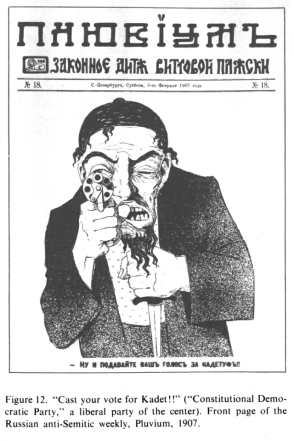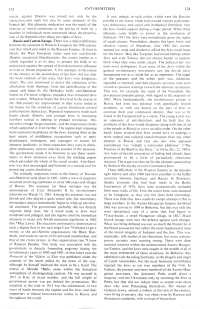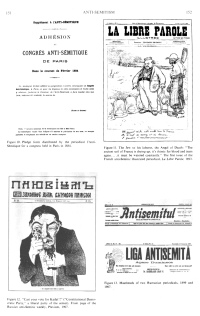[Racist czar and drive for
revolution - and more racist Czarist measures of
discrimination]
<There was a radical difference between the situation in
western Europe in the 19th century and that which prevailed i
the Russian Empire. At least in theory the West European
states were not anti-Jewish. Despite occasional
liberalizations, the [[criminal racist]] czarist regime as a
whole regarded it as its duty to protect the bulk of its
population against the spread of Jewish economic influence or
even of Jewish population. A few attempts in the course of the
century at the assimilation of the Jews did not alter the
basic outlook of the state, that Jews were dangerous aliens.
The [[criminal racist]] czar continued to derive the
validation of his absolutism from [[criminal racist
"Christian"]] theology, from the identification of the Caesar
and Jesus by the Orthodox faith; anti-Semitism based on
Christian religious prejudice thus remained alive and
virulent. Whatever hopes the Jews had in the course of the
19th century for improvement in their status rested in the
hopes for he evolution of czarist absolutism toward
parliamentary democracy.
Repeated repressions made such hopes clearly illusory, and
younger Jews in increasing numbers turned to helping to
prepare revolution. This served to enrage the [[racist
corrupt]] government, and the reactionary circles which
supported it, even further. The regime kept imposing more
economic disabilities on the Jews, keeping them in the least
secure of middlemen occupations such as petty shopkeepers,
innkeepers, and managers of estates for absentee [[not
present]] landlords; in these capacities Jews were in direct,
often unpleasant, contact with the poorest of the peasants.
The government made it its business to use these resentments
to draw attention away from the seething [[coming up]] angers
which pervaded the whole of the social system. Anti-Semitism
was thus encouraged and fostered as a tactical tool for
preserving [[criminal racist "Christian"]] czarist absolutism.
[Czar murdered in 1881 -
riots - all Jews are blamed - anti-Jewish economic
legislation since 1882 - anti-Semitic parties and
organizations, financed by the Czar - Beilis case]
The critically important event in the history of Russian
anti-Semitism took place in 1881, when a wave of pogroms
occurred involving outbreaks in some 160 cities and villages
of Russia. The occasion for these outrages was the
assassination of Czar Alexander II by revolutionary terrorists
on March 13, 1881. Among the assassins was one Jewish girls
who played a quite minor role, but reactionary newspapers
almost immediately began to whip up anti-Jewish sentiment. The
government probably did not directly organize these riots, but
it stood aside as Jews were murdered and pillaged, and the
regime used the immediate occasion to enact anti-Jewish
economic legislation in 1882 (the *May Laws).
The situation continued to deteriorate to such a degree that
in the next reign Czar *Nicholas II gave money to the
anti-Semitic organization, the Black Hundreds, and made no
secret of his personal membership, and that of the crown
prince, in that organization (see *Union of Russian People).
This body was associated with the government in directly
fomenting pogroms during the revolutionary years of 1903 and
1905; in that latter year the Protocols of the *
Elders of Zion was
published under the auspices of the secret police by the press
of the czar, although he himself believed the work to be a
fraud.
The ordeal [[public suicide]] of Mendel *Beilis arose within
the hysterical atmosphere of disintegrating czarism. He was
accused in 1911 in Kiev of ritual murder, and the full weight
of government power was put behind the prosecution. His
acquittal at the trial in 1913 was the culmination of two
years of battle between the regime and the Jews and their
supporters in liberal humanitarian circles in Russia and
throughout the world. (col. 123)
It was, indeed, in such circles, which were the Russian
parallel to the forces which had created western parliamentary
democracy and social and intellectual liberalism, that the
Jews found support during a tragic period. When these elements
came briefly to power in the revolution of February 1917 the
Jews were immediately given the rights of equal citizens.
Nonetheless, despite this later, brief, and abortive victory
of liberalism, after 1882 this current seemed to weak and
divided to afford the Jews much hope for the future. Men like
Turgenev had mixed feelings about Jews and even Tolstoy did
not always hasten to support them when they were under attack.
The political left was even more ambiguous. Even some of the
Jews within the general revolutionary movements saw the Jewish
petty bourgeoisie not as a victim but as an oppressor. The
anger of the peasants and the urban poor was, therefore,
regarded as merited, and their pogrom activities were even
viewed as positive stirrings toward the ultimate revolution.
This was, for example, the stand of the Narodniki, the
pro-peasant populist group, with regard to the pogroms of
1881. More fundamentally, the revolutionary groups in Russia
had even less patience with specifically Jewish problems, or
with any desires on the part of Jews to continue their own
communal identity. than was to be found in the European left
as a whole.

Encyclopaedia Judaica (1971): Anti-Semitism, vol. 3, col.
151b: cartoon of the election of Kadet in 1907
"Cast your vote for Kadet!!" ("Constitutional Democratic
Party", a liberal party of the center). Front page of the
Russian anti-Semitic weekly, Pluvium, 1907.
The young Lenin was an opponent of anti-Semitism, and he held
that the problems of the Jews would disappear along with that
of all other people in Russia in a new socialist order. On the
other hand, Lenin insisted that Jews would have to undergo a
mire radical and cultural transformation than any other
element in Russia and that any Jews who opposed assimilation
was "simply a nationalist philistine" ("The Position of the
Bund in the Party", in
Iskra,
Oct. 22, 1903).
Any form of Jewish association of feeling had already been
pronounced to be a form of particularly obnoxious reaction.
the stage was thus set for the ultimate questioning by Stalin
of the loyalty of even Communist Jews.> (col. 124)
Sources
|

Encyclopaedia Judaica (1971): Anti-Semitism, vol. 3,
col. 123-124
|

Encyclopaedia Judaica (1971): Anti-Semitism, vol. 3,
col. 151-152 |






